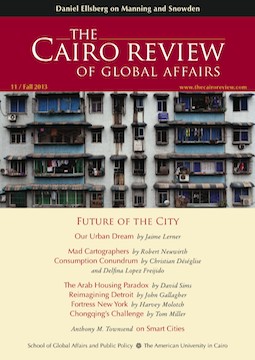Fall 2013

Cairo Review No. 11
Future of the City
Q & A
Dangerous Man
Daniel Ellsberg leaked the Pentagon Papers to the New York Times in 1971 in hopes of ending U.S. military involvement in Vietnam. He speaks with Managing Editor Scott MacLeod about America’s latest whistleblowers, Chelsea Manning and Edward Snowden—and explains how unchecked power threatens the human race.
Essays
Our Urban Dream
The former mayor of Curitiba says decisive battles for the quality of life are being fought in cities, with the future of the planet at stake. He calls for citizen participation on a global scale to overcome poverty, ignorance and environmental degradation. To innovate, he argues, is to begin.
Mad Cartographers
Government bulldozers flattened the Badia East squatter district in Lagos earlier this year. Suppose its nine thousand residents had drawn maps, kept records, and documented their community’s dynamism over the past thirty years. Would it have been quite so easy to evict them?
Consumption Conundrum
The urban centers of the New Economic Powers are bent on GDP growth to become influential global cities. Yet the Western model being emulated is itself facing serious sustainability challenges. It is necessary to ask whether material possessions and use of natural resources are the best measure of prosperity.
The Arab Housing Paradox
From Cairo to Casablanca and beyond, millions of Arabs live in munatiq ‘ashwa’ia, or random areas. Informal developments continue to expand in response to state failure and incapacity. Arab governments should stop focusing on hyper-modern schemes and start empowering the poor for the creation of formal, legal neighborhoods with affordable housing.
A Garden in Cairo
Once the site of a garbage dump, Al-Azhar Park is a verdant haven in the heart of one of the world’s most densely populated cities. The development project, led by the Aga Khan Trust for Culture, achieved a grand urban vision for revitalizing center-city neighborhoods, restoring Islamic historical sites and reviving ancient crafts.
The Nature of Cities
The modern metropolis is vulnerable to all sorts of sudden and gradual threats, from hurricanes and earthquakes to the consequences of global warming. To cope, society must be resilient and the city managed well. Be prepared! Here’s an Urban Dweller’s Guide to the Elements.
Quest for a New Utopia
By the year 2100, our cities may be home to eight billion people, 80 percent of the projected global population. Much depends on how we navigate the intersection between urbanization and digital technology. Build the Smart City, but one street corner at a time.
Reimagining Detroit
The Motor City, once the world automobile capital, is now better known for urban decay. Public services are abysmal, crime rampant, and leadership absent. But a promising comeback may be in the works, thanks to civic-minded corporate executives, leaders of charitable foundations, and nonprofit neighborhood groups.
Chongqing’s Challenge
A Yangtze River boomtown reveals the dark side of China’s rapid urbanization. The skyline looks like another Hong Kong, with towering modern buildings and soaring bridges, but a closer look reveals worsening social stratification. By focusing on short-term economic gains, Chinese leaders risk creating divided cities with expansive slums and ghettoes of extreme wealth.
Fortress New York
Since the September 11 attacks, Gotham lives under a blanket of tight security. Police and guards seem everywhere. Inspections, intrusions and blockages are the norm. The financial cost is huge. Quality of life is diminished. Is there anything to show for it?
The Trial of Chelsea Manning
A military judge found the U.S. army private guilty on twenty espionage and other charges related to the leaking of military field reports and diplomatic cables to WikiLeaks. But the lack of transparency in the proceedings raises questions about the legitimacy of the verdict and the harshness of the sentence. Rather than achieving justice, the conviction highlights President Obama’s war on whistleblowers.
Midan
Damage Control
A political prisoner freed. An affidavit documenting police abuse. An audience with lawmakers. When Egyptians rose up in 2011, human rights campaigner Heba Morayef dared to hope that such incremental accomplishments were giving way to freedom and democracy. But the dream didn’t last for long.
Oriental Hall, etc.
Egypt’s changing of the guard in July brought a number of AUC alumni into the interim government formed by President Adly Mansour.
Keeping Hope Alive
At present, what is of major concern to the Egyptian citizen is a need to realize the January 25 demands for better quality of life, freedom, human dignity and social justice.
Book Reviews
The World Through Arab Eyes
The writing of a new Middle East narrative.
Foreign Policy Begins at Home
Analyzing an overcommitted, underperforming United States.
Texts
United Sates National Security Agency
Statements in response to the U.S. National Security Agency leaks.
